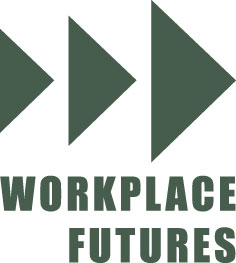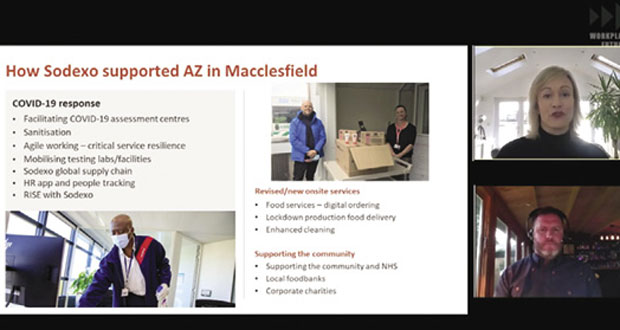The 2021 Workplace Future Conference delivered a positive message that FM is in an exceptional position to help shape the post pandemic working world
The first big FM conference of the season marks a year since Workplace Futures 2020, the last live FM event before the pandemic hit. Introducing the online conference, Chair Martin Pickard said there was never more important a time to share what we’ve all learnt over the past year, and poignantly, held a minute’s silence for the front-line FM people lost to COVID-19.
The overriding theme of the conference however, was of positivity, with a focus on how the sector can build on its enhanced credibility and continue to demonstrate the value FM adds to client organisations and the wider economy and society.
In his keynote address Simon Titchener, CCO at ISS urged delegates to stay flexible and embrace the uncertainty that will continue to dog us all over the coming months. He noted that while working from home remains a hot topic, employers need to understand that collaborative work will still require an office environment. The workplace has been recast he said, as “any place and not just four walls. It’s not a physical asset but a bubble around an individual to help them meet their goals.”
The most attractive employers will be the most flexible he concluded and there has never been a better opportunity for FM companies to deliver this and help drive client businesses forward.
FUTURE FORTUNES
In his overview of the economy coming out of lockdown Ian Marson from EY warned of an insolvency dam. Over 30 per cent of real estate firms issued a profit warning last year and many will struggle to continue once the furlough scheme comes to an end. However, the changes wrought by COVID have seen the expectations of employees change, which may benefit the FM sector in the longer term, as clients draw on FM expertise to help attract staff back into offices.
The UK FM market will see a drop in revenues of -5.8 per cent in 2020, as a result of COVID-19 and will not return to 2019 levels until 2022 said John Raspin of Frost & Sullivan. More encouragingly he predicted future steady growth, fuelled by the convergence of digital technology and services that enhance organisational productivity and the user experience. Partnership and the co-creation of services are key. “It’s tough to take on the future alone, which is why collaboration will be extremely important in the future.”
The huge disruption in a shift to home working brings an opportunity to change how we look at property, argued Rob Harris, Principal of Ramidus Consulting. We need to move from building more to building better, as operational resources where customer needs are to the fore. The real estate sector he said, needs to be an agent of change in this; focusing in the future on service, environment, social justice and business performance.
Digital technology has advanced exponentially over the past year and Mark Miller, Workplace Technology Strategist at Cisco believes technology will be needed to support a very dispersed workforce in the years to come while supporting people going back into work to be with their colleagues, socialise and learn.
OFFICE FUTURES
What of the future of the office amidst all this disruption? It was comforting to hear Marie Puybaraud, Global Head of Research at JLL reassure us that the crisis has given us a unique opportunity to realign the workplace and pilot new concepts to help create the future of work. According to JLL research the majority of employees want to return to work, with nearly a quarter (24 per cent) opting to be in the office all of the time, and 66 per cent preferring to alternate between different places to work. 2020 she added, was a wake-up call in terms of sustainability, moving it to the top of the agenda and incorporating areas such as health and wellness.
Baskar Sundaram of, consultancy & strategy advisors Baachu advised we’re all reacting to the shock of COVID and there are so many moving parts, the whole market is in reaction. There are seismic changes to come he believes over the next 10 years, but, “how you behaved in times of crisis” will stick in people’s minds.
Following the pandemic said Peter Ankerstjerne of Planon Group and IFMA we must ensure we’ve sufficient business continuity processes in place and FMs need to embrace the new reality of supporting home working, flexible offices, and third places such as a coffee shop or lounge, whichever makes more sense for a person to work. Flexibility is key to help build collaborative ecosystems in the workplace using FM as the facilitator.
The conference organisers delivered an excellent case study. AstraZeneca’s Head of FM Dan Rogers and Julie Ennis, CEO Corporate Services for Sodexo described the delivery of services to AZ’s giant Macclesfield campus during the development of the vaccine. Their presentation was a great reminder that the best FM helps organisations achieve their overall objectives, which in this case was giving science the right surroundings and services to meet their goals.
SOCIETAL SERVICE
Simon Venn, Chief Government & Strategy Officer for Mitie reflected on the societal role FM has taken over the last year, specifically in partnering with traditional competitors to complete in record times the Nightingale and Dragons Heart hospitals and the creation of hundreds of COVID 19 test centres. He said: “I was so impressed in the way our sector stepped up to help the nation. The ability to rapidly adapt is a hallmark of the FM sector and something we’ve shown throughout this crisis.”
At the other end of the scale from Mitie, Andrew Hulbert, Managing Director of Pareto FM argued that SME’s have shown they are best served to respond quickly to customer demands in these unprecedented circumstances. He echoed other speaker’s praise for the FM heroes who for “the entirety of the pandemic went back into buildings to clean, secure or checks assets”.
This thought was echoed by CEO of CityFM Paul Bean who reflecting on the ways his organisation met the challenges of the last year, said: “this pandemic has shown we can utilise technology better, what works well, and what doesn’t and the value of human contact.”
 Summing up the day in her usual incisive way, Lucy Jeynes of Larch Consulting asked how FM can build on the recognition it’s won in playing such a key role in keeping the economy moving and contribution of frontline workers? “We know it’s a challenge so we need to imagine the solution and lead not follow. It’s no longer about plodding through a contract, but leading clients in new directions by adding value and upping our game.”
Summing up the day in her usual incisive way, Lucy Jeynes of Larch Consulting asked how FM can build on the recognition it’s won in playing such a key role in keeping the economy moving and contribution of frontline workers? “We know it’s a challenge so we need to imagine the solution and lead not follow. It’s no longer about plodding through a contract, but leading clients in new directions by adding value and upping our game.”
If the sector manages to adopt just some of the suggestions made at Workplace Futures 2021 it will be in a much stronger position to navigate the post pandemic world.





